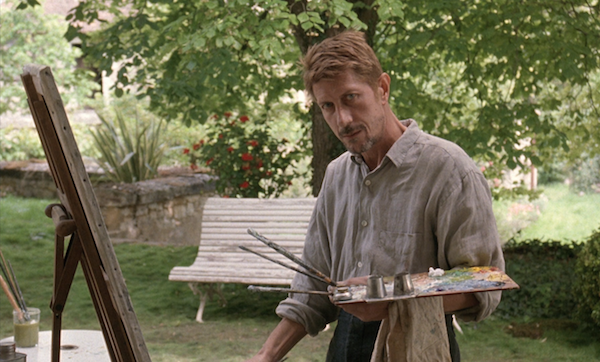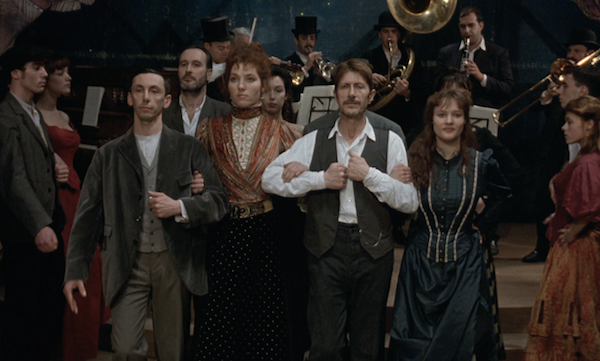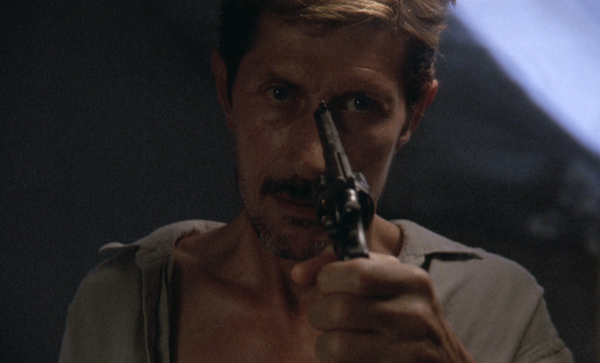| Reviews & Columns |
|
Reviews DVD TV on DVD Blu-ray 4K UHD International DVDs In Theaters Reviews by Studio Video Games Features Collector Series DVDs Easter Egg Database Interviews DVD Talk Radio Feature Articles Columns Anime Talk DVD Savant Horror DVDs The M.O.D. Squad Art House HD Talk Silent DVD
|
DVD Talk Forum |
|
|
| Resources |
|
DVD Price Search Customer Service #'s RCE Info Links |
|
Columns
|
|
|
Van Gogh (The Films of Maurice Pialat: Volume 3)
The Movie:

Much like Mike Leigh's unfairly neglected artist portrait Mr. Turner, Maurice Pialat's excellent 1991 film Van Gogh does not attempt to squeeze its subject into a typical biopic mold; instead, it uses slice-of-life vignettes to conjure the famous painter as a flesh-and-blood man. Pialat's version of Vincent Van Gogh is unsurprisingly similar to the prickly, emotionally detached, and somewhat debauched protagonists of his earlier fiction films -- which are, for the most part, semi-autobiographical. Whether or not Pialat has chosen to re-fashion Van Gogh in his own image is up for debate (and probably beside the point), but Pialat has definitely transmogrified the last two months of Van Gogh's life into another uniquely personal, bold, and unexpected narrative.
When we first see rocker-turned-actor Jacques Dutronc, as Van Gogh, getting off a train in rural Auvers-sur-Oise, he seems gaunt and quiet -- humbled, even. He's had his major breakdown. He's cut his ear (although Pialat wisely avoids giving Dutronc distracting prosthetic scars) and been hospitalized. Now he just needs to recuperate. When the proprietor of his boarding house offers him wine, he declares that he doesn't drink.
Vincent visits the home of Dr. Gachet (Gérard Séty), who is an art collector and amateur painter. The doctor claims that there is nothing physically wrong with him, and that some rest should do him good. The doctor has a petulant teenage daughter, Marguerite (Alexandra London), who sits for Van Gogh a few times and then commences to flirt with and seduce the far-from-rehabilitated painter. Before too long, Van Gogh is indulging in too much booze, painting up a storm, and pondering giving in to the young woman's advances. A prostitute with whom he had a prior familiarity, Cathy (Elsa Zylberstein), also reappears in Vincent's life, creating a love triangle that helps to muddy his already not-very-clear mindset.
Pialat pairs this triangle with another, even more turbulent one. Vincent's brother Theo (Bernard Le Coq) and his wife Jo (Corinne Bourdon) both find themselves alternately drawn in and repelled by Vincent, as he tries to play them off each other for sympathy. Influential art dealer Theo, as has been oft-dramatized, loved and supported his brother, but failed to find him any commercial success in his lifetime, and their interactions in the film are fraught with rarely addressed resentments and growing bitterness.
Although Pialat's storytelling style is elliptical and resolutely matter-of-fact, he manages to bring all of his threads together in a relatively tense and emotional third act where Vincent bottoms out and must confront the repercussions of the emotional games he has been playing, with Marguerite and Cathy, and with Theo and Jo. Since Vincent's final recourse is already well-known, it is not much of a spoiler to reveal that he essentially refuses to face what he has done to those around him. But unlike Vincent, Pialat never flinches from digging into the messy psychological and emotional terrain of his subject matter.
Jacques Dutronc won the César (aka the "French Oscar") for his performance as Van Gogh, and it is a strikingly nuanced (and no doubt emotionally draining) acting job. In fact, the whole cast does fine work, and they fit elegantly into Pialat's melancholy and slightly drab canvas. Van Gogh is probably not the most factually accurate depiction of the painter, but it beautifully represents the intersection of Pialat and Van Gogh's shared artistry.

The Blu-ray
Van Gogh (The Films of Maurice Pialat: Volume 3) comes in a 2-BD set, with the feature film on the first disc and all the bonuses on the second.
The Video:
A slightly soft, but overall quite pleasing AVC-encoded 1080p 1.66:1 presentation. In matching Pialat's matter-of-fact approach, Emmanuel Machuel's photography has a typically naturalistic feel. Some outdoor sequences are a bit lush, with greenery looking quite vivid in the dappled sunlight. Minimal digital compression issues.
The Audio:
I'm not sure what happened. The European Blu-ray of this title has a lossless audio track but, like the films in Volume 1 and Volume 2 of Cohen's Maurice Pialat collections, this release offers only a lossy (448kbps) French Dolby 2.0 mono track (with optional English subtitles). There are no other significant examples of damage or glaring flaws apparent in this transfer.
Special Features:
(HD upscale, 21:29) - Dutronc puffs on a big stogie, sips red wine, and reflects casually on working with Pialat. He's slightly resigned when discussing the difficulties the two of them had (Pialat apparently micromanaged Dutronc's performance), and Dutronc's tone is one of grudging respect for the late filmmaker.
Final Thoughts:
French iconoclast Maurice Pialat puts a lot of himself into this screen version of Vincent Van Gogh. Purists might blanch, but Pialat has such a knack for uncomfortable yet understated drama that the film is nothing short of a triumph. We may not want to be friends with this Van Gogh, but we can't look away either. Highly Recommended.

Justin Remer is a frequent wearer of beards. His new album of experimental ambient music, Joyce, is available on Bandcamp, Spotify, Apple, and wherever else fine music is enjoyed. He directed a folk-rock documentary called Making Lovers & Dollars, which is now streaming. He also can found be found online reading short stories and rambling about pop music.
|
| Popular Reviews |
| Sponsored Links |
|
|
| Sponsored Links |
|
|
| Release List | Reviews | Shop | Newsletter | Forum | DVD Giveaways | Blu-Ray | Advertise |
|
Copyright 2024 DVDTalk.com All Rights Reserved. Legal Info, Privacy Policy, Terms of Use,
Manage Preferences,
Your Privacy Choices | |||||||














